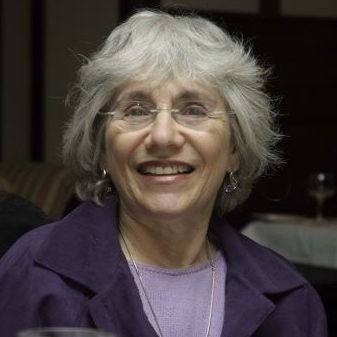
Dr. Janice R. Levine PH.D.
Psychologist
76 Bedford Street Lexington MA, 02420Practice Philosophy
![]() Integrative Medicine
Integrative Medicine
About
Janice Levine, PhD, is a clinical psychologist who specializes in couples relationships and family development. She received her undergraduate degree from Yale University and her graduate degrees from Harvard University.
Education and Training
Harvard University PhD 1983
Yale University BA 1976
Provider Details

Dr. Janice R. Levine PH.D.'s Expert Contributions
Is marriage counseling worthwhile soon after getting married?
Not only does it make sense, but it's the right thing to do. No one teaches you how to be married and how to be a healthy couple in a healthy relationship. We all do what we know, in good faith. But there's so much more to learn! If you ignore these issues, or don't resolve them in a healthy way, they fester and grow into intractable problems later on. Please see someone while you are still young and flexible, and while you have the motivation to learn and change. It's insurance for a lifetime. READ MORE
Do I need a psychologist for my depression?
Yes - you do need to be evaluated by a Psychologist or mental health professional, and perhaps a Psychiatrist for medication. Lack of motivation and 'anhedonia' (inability to experience joy), as well as excessive sleeping and isolation are all clear signs of depression. Life need not be that unhappy for you! The good news is that that medication and psychotherapy should definitely be helpful. Good luck. READ MORE
Should we go to counseling before getting divorced?
Things can get unexpectedly messy during a divorce. If you mediate, you may not need counseling, too. If not and if there are kids, I’d recommend counseling to negotiate your wishes amicably before getting lawyers involved. READ MORE
Can one start showing symptoms of ADHD as an adult?
Yes, it is most certainly possible to develop or evidence ADHD as an adult. Often, the symptoms are masked in childhood but they can just as easily first appear in adulthood. A differential diagnosis would be helpful, as there are other conditions (anxiety, mania) that can look like ADHD, but not actually be attention deficit. And of course, the "H" (hyperactivity) may or my not be present. Psychological testing is the most reliable way to make an accurate diagnosis. READ MORE
What are the best ways to overcome negative thoughts?
Mindfulness meditation is the best way I know of to overcome intrusive thoughts. It's a practice that teaches you to witness the nature and content of your thoughts, and gently return your focus to your breath and the present moment. It doesn't stop negative thoughts from coming, and nothing can, but it gives you facility in recognizing them sooner and having the mental agility to reroute negative thoughts to the here and now. Negative thoughts live in the past or the future; the present is nearly always safe. We either regret (looking backward) or fear (looking forward), neither of which we can control at the present moment. Negative thoughts in the form of self-loathing are best helped by CBT or CBT, in conjunction with mindfulness meditation. Good luck! READ MORE
Is biofeedback helpful?
Absolutely! It's a wonderful option that should be first string for everyone. Our bodies hold and convey our feelings to us, and if we can learn to listen to our bodies' sensory feedback and regulate our internal response, it changes our experience of things. It can make us go from agitated to calm, and when our bodies feel calm, we don't experience being stressed the same way. This is how we become in charge of our emotional experiences. Stress isn't a "thing" that exists independent of our response to it. Though there are commonly perceived pressures and stressful events, our interpretation of what is or isn't stressful is what lands in our bodies. Prior to feeling stressed and having to manage it, we can also learn how to interpret events differently, such that they don't affect us in the same way. For example, the more we feel in control of our internal experiences, the more we are able not to feel helplessly victimized by them, i.e., we can choose how to respond, and we can regulate our reactions. Learning to be sensitive to our own heart rate, racing thoughts, sweat, shakiness, etc., is important data that enables us to face stressful events with a sense of mastery. Too much stress can shorten the lifespan - biofeedback can literally extend your life! READ MORE
Is anxiety disorder normal with aging?
It is very common for people to become more anxious as they get older. Personal safety and security become prime motivators in life; new and increasing ailments remind a person that they are vulnerable. Older people typically become more cautious and risk-averse with age. That said, it should not get in the way of performing normal activities nor should it occupy as much worry and concern as you describe. While not necessarily abnormal, anti-anxiety medication could be helpful to take the edge off and has little if any side effects. Check with the doctor to evaluate its appropriateness. READ MORE
At night, thinking prevents me from sleeping. Can I do anything about it?
You may not be able to stop your mind from thinking, but it is possible to learn how to divert and relax your racing thoughts. The best technique comes from learning mindfulness meditation, where the practice involves witnessing the act of having a thought, and then returning to a focus on your breath. Your mind will naturally start thinking again, and each time you notice this you gently return to your breath. This practice offers a way to manage ones own thought process and return to the present moment, so you don't get lost in run-away thoughts. Calming the mind can also help you relax. READ MORE
What causes negative thoughts in a person?
It depends on the severity and frequency of these negative phases. Are these periods sustained and frequent, or episodic and rare? If it happens continuously or is increasing in frequency it might suggest depression. If your negative thoughts increase in intensity, become scary, paranoid or suicidal, it is also problematic. But if you get in periodic funks that abate and don't go too deep I wouldn't be concerned. Track these patterns and if you find you can't willfully turn your thoughts around, or they happen more frequently or intensely, you are probably depressed and should see a therapist. READ MORE
Faculty Titles & Positions
- Clinical Instructor in Psychology, Dept. of Psychiatry Harvard Medical School 1999 - 2003
- Instructors Massachusetts School of Professional Psychology 1991 - 1995
- Lecturer in Psychology Harvard University 1985 - 1986
- George and Cecile Naumberg Fellow Harvard University 1979 - 1981
- Clinical Fellow in Psychology in the Dept. of Psychiatry Harvard University 1979 - 1981
Awards
- Branford Arts Prize 1976 Yale University
- Whos Who Among Human Service Professionals
- Whos Who Among American Women
Treatments
- Couples Therapy
- Marriage Education
- Individual Psychotherapy
- Parent Education
- Consultation Services to Individuals and Organizations
- Supervision
- Relationship Counseling
- Relationship Issues
- Grief Counseling
- Depression
- Anxiety
- Stress
- Life Transitions
Professional Memberships
- American Psychological Association
- Massachusetts Psychological Association
- Professional Member American Psychological Association
- Professional Member Massachusetts Psychological Association
- Professional Member Coalition for Marriage, Family and Couples Education
Publications
- Jossey-BassWhy Do Fools Fall in Love?2001
- Jossey-BassBeyond the Chuppah: A Jewish Guide to Happy Marriages2001
Charities and Philanthropic Endeavors
- Founder and President, Partners for ACCESS (African Community Center for Social Sustainability), Uganda
- Board of Directors (Past): Terezin Music Foundation
Dr. Janice R. Levine PH.D.'s Practice location
Dr. Janice Levine
76 Bedford Street -Lexington, MA 02420Get Direction
Dr. Janice R. Levine PH.D.'s reviews
Write ReviewRecommended Articles
- How an Autism Expert Failed to See His Own Son's Asperger's
Many children with Asperger’s syndrome are initially diagnosed with ADHD and then later diagnosed with Asperger’s syndrome in adulthood when seeking help for directly related matters such as depression or persistent anxiety. This is how it took professor Tony Attwood, clinical psychologist, 35...
- Stress Can Lead to Binge Eating
According to a new survey presented at the annual meeting of American Psychological Association, there are those that lose their appetite when under stress but for the most part, people tend to overeat at the time of stress. The study conducted under the leadership of Kayla Ten Eycke, MSc, of the...
- Understanding Clinical Depression
Clinical depression is a serious medical illness that negatively affects how an individual feels, thinks, and how he or she acts. Depression varies from mild to severe, and in certain instances the individual can experience temporary episodes of sadness.Clinical depression is also known as major...
- What Is Antisocial Personality Disorder?
Antisocial Personality DisorderAntisocial personality disorder, also called sociopathy, is a type of personality disorder that is characterized by irresponsible, criminal, and impulsive behavior. A person with antisocial personality disorder is often reckless, dishonest, and manipulative with no...
- What Is an Outgoing Introvert?
What is an outgoing introvert?Sometimes, an outgoing introvert show traits or features of an introvert, but certain things just don’t resonate with them, which can be seen in other extroverts. You may not spend time alone on weekends and would like to spend time out with friends. You may also have...
- How To Help Your Loved One Combat Geriatric Depression
Clinical depression is very common in elderly people. While the cause of depression is different depending on the individual, one of the main reasons behind geriatric depression is loneliness. Family members usually focus on the physical health of their elders and deliberately ignore another...
Nearby Providers
- Marian Kaplun Shapiro17 Lantern Lane Lexington Massachusetts 02421
- Dr. Justin Hill PH.D.150 S Huntington Ave Jamaica Plain MA 02130
- Dr. James A. Manganello PH.D.9 Grapevine Ave Lexington MA 02421
- Dr. David Newton Danforth Jr PH.D.93 Union St Newton Center MA 02459
- Dr. Luanna E Devenis PH.D.76 Bedford Street Lexington Massachusetts 02420-4641
- Daphne Fatter PH.D.1269 Beacon St Brookline MA 02446
Nearest Hospitals
WINCHESTER HOSPITALl
41 HIGHLAND AVENUE WINCHESTER MA 1890EMERSON HOSPITALl
OLD ROAD TO 9 ACRE CORNER W CONCORD MA 1742MOUNT AUBURN HOSPITALl
330 MOUNT AUBURN STREET CAMBRIDGE MA 2138








